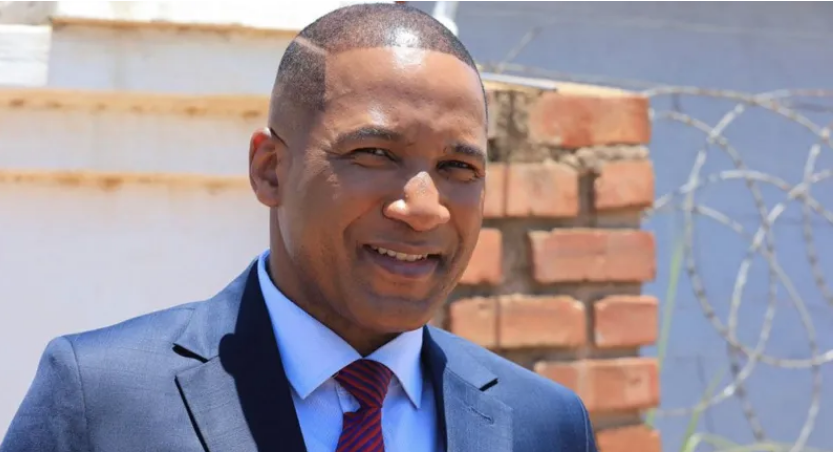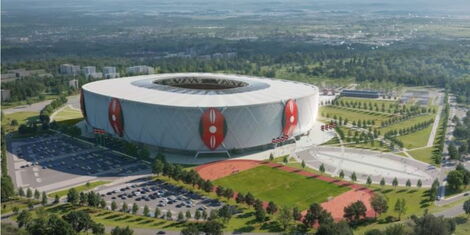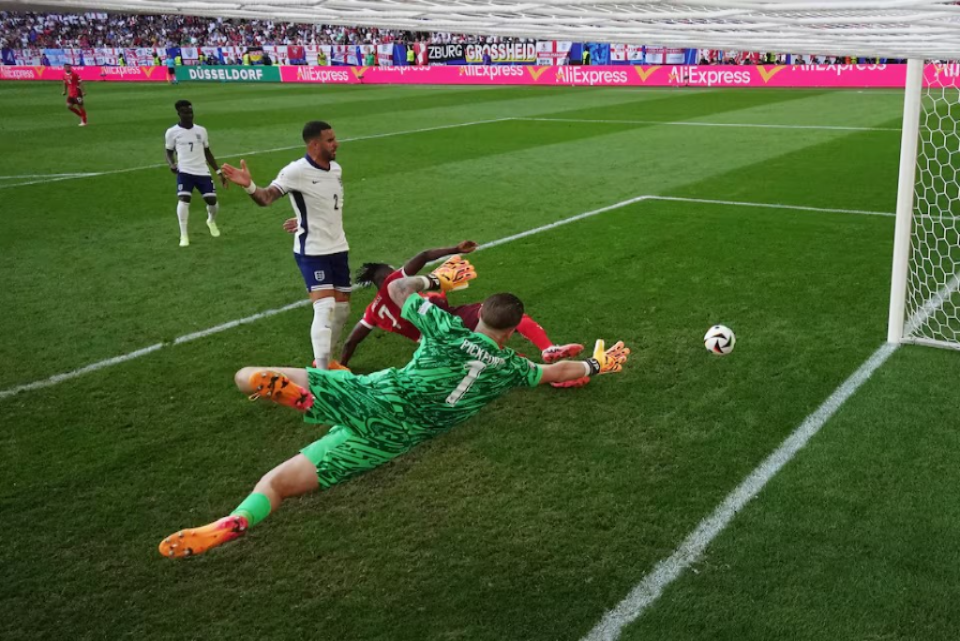Vladimir Putin is facing the greatest threat to his authority in two decades after the head of the Wagner paramilitary group launched an apparent insurrection, claimed control of military facilities in two Russian cities, and warned that his troops would head for Moscow.
Staring down a sudden and staggering escalation of internal tensions that have simmered for months, the Russian president said on Saturday that those on “path of treason” or armed rebellion would be punished.
“It is a stab in the back of our country and our people,” he said in an address to the nation, threatening a harsh response for those planning “an armed rebellion.”
Putin was speaking after the militia chief and his one-time ally Yevgeny Prigozhin dramatically stepped up his feud with Moscow’s security establishment over the handling of the invasion of Ukraine, throwing the country into crisis with a series of military moves that seemingly took Moscow by surprise.
After Putin’s speech, Prigozhin said on Telegram that the president was “deeply mistaken.”
“We are patriots of our Motherland, we fought and are fighting,” he said in audio messages. “And no one is going to turn themselves in at the request of the president, the FSB or anyone else.”
Prigozhin, who heads private military group Wagner, said his forces had taken control of Russian military facilities in the city of Rostov-on-Don, an important operations base for Russia’s war in Ukraine. He threatened to march on Moscow if defense minister Sergei Shoigu and Russia’s top general Valery Gerasimov did not meet with him in Rostov.
The Wagner group also claimed to have seized Russian facilities in a second city, Voronezh, some 600 kilometers (372 miles) to the north of Rostov-on-Don. The governor of the Voronezh region, Alexander Gusev, said the Russian military were engaging in “combat measures” in the area.
In its daily intelligence update, Britain’s Ministry of Defense said Prigozhin’s insurrection “represents the most significant challenge to the Russian state in recent times.”
The briefing said some Russian forces had “likely remained passive, acquiescing to Wagner.”
And it predicted that individual decisions to support or betray Putin could tip the balance of the showdown. “Over the coming hours, the loyalty of Russia’s security forces, and especially the Russian National Guard, will be key to how the crisis plays out,” the report said.
The developments leave Putin’s grip on power looking suddenly perilous, 16 months after he launched an invasion of Ukraine that has been beset by military setbacks, strategic failure and disorganization.
In his remarks, Putin described events in Rostov as an insurrection. “The situation in Rostov-on-Don remains difficult during the armed uprising. In Rostov, the work of civil and military administration is basically blocked,” Putin said, adding that “decisive action” would be taken.
Prigozhin has been notoriously critical of the Russian military hierarchy since the war in Ukraine started. But he had spared Putin from direct criticism, instead directing his ire towards the President’s commanders.
The private military chief seemingly built influence with with Putin over the course of the conflict, with his Wagner forces taking a leading role in the labored but ultimately successful assault on Bakhmut earlier this year. The capture of that city was a rare Russian gain in Ukraine in recent months, boosting Prigozhin’s profile further.
But his rhetoric on Friday and Saturday indicated that Prigozhin had turned not merely against the military leadership’s handling of the invasion of Ukraine, but also on the longtime Russian leader.
On Friday, he said Moscow invaded Ukraine under false pretenses devised by the Russian Ministry of Defense, and that Russia is actually losing ground on the battlefield. That was a significant change from his previous criticism. In the past, he defended the reasoning for the war but was critical of how it was being done by the defense minister, Shoigu.
“When we were told that we were at war with Ukraine, we went and fought. But it turned out that ammunition, weapons, all the money that was allocated is also being stolen, and the bureaucrats are sitting [idly], saving it for themselves, just for the occasion that happened today, when someone [is] marching to Moscow,” Prigozhin said in his Saturday Telegram messages.
An overnight assault
This dramatic escalation came after Prigozhin accused Russian forces of striking a Wagner military camp and killing “a huge amount” of his fighters – a claim Russia’s Ministry of Defense has denied and called an “informational provocation.”
The militia chief, whose forces have played a key role in Russia’s invasion of Ukraine, warned of retribution in a series of Telegram messages Friday and Saturday, where he announced his forces were moving into the Rostov region neighboring Russian-occupied Ukraine, ready to “destroy everything” in their way.
“There are 25,000 of us and we are going to find out why there is such chaos in the country. There are 25,000 of us waiting as a tactical reserve and a strategic reserve. It’s the whole army and the whole country, everyone who wants to, join us. We must end this debacle,” hte said, in a radical escalation of a longstanding feud with Russia’s military leaders.
Russia’s domestic intelligence service, Federal Security Service (FSB), responded on Friday, urging Wagner fighters to detain their leader and opening a criminal case against the militia boss accusing him of “calling for an armed rebellion.” Authorities in the capital Moscow, meanwhile, tightened its security measures.
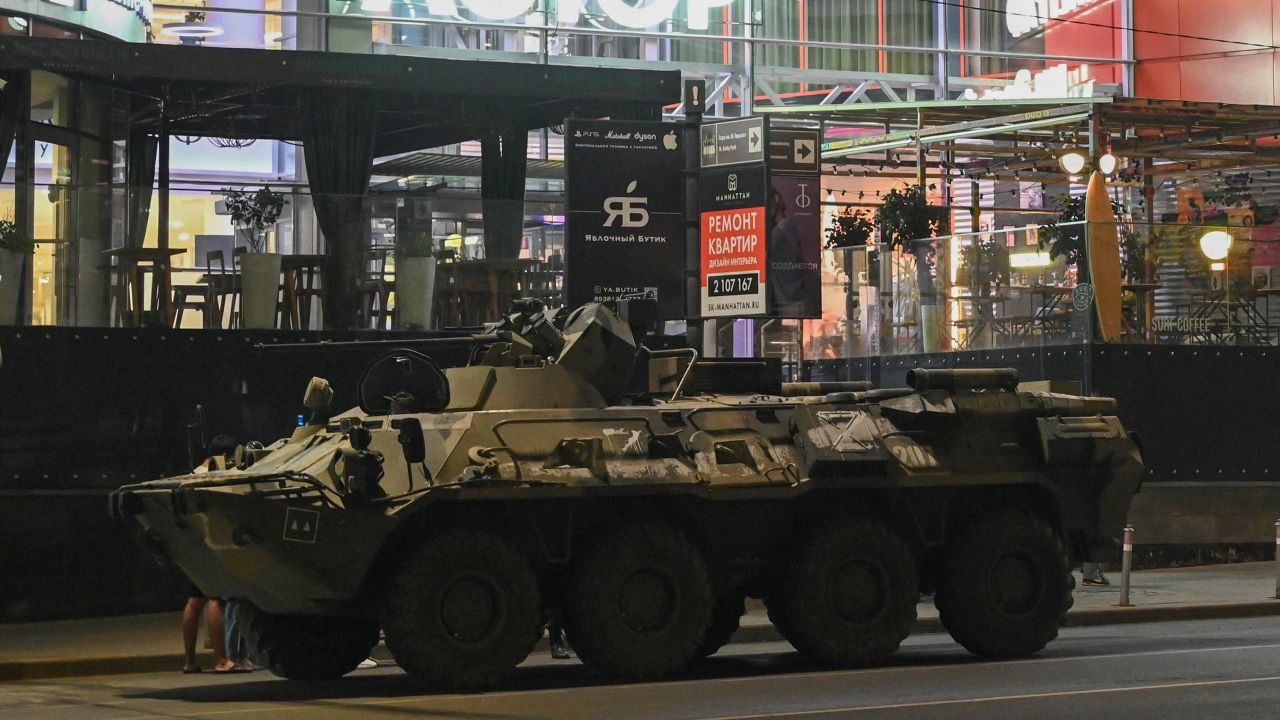
An armored personnel carrier next to a shopping mall in the southern Russian city of Rostov-on-Don on June 24, 2023.Stringer/Reuters
Many officials quickly rallied to Putin’s side. Russian intelligence official, Lt. Gen. Vladimir Alekseev, posted a video about Prigozhin’s actions that day, describing it as a coup attempt.
“Only the president has the right to appoint the top leadership of the armed forces, and you are trying to encroach on his authority. This is a coup d’etat. There is no need to do this now, because there is no greater damage to the image of Russia and to its armed forces,” he added.
Prigozhin denied his acts were a coup, saying instead they were a “march of justice” that would “not interfere with the troops in any way.”
Another key figure, Chechen leader Ramzan Kadyrov spoke of a “vile betrayal” by Prigozhin on Telegram. “The rebellion must be crushed, and if this requires harsh measures, then we are ready!” he said.
But in Ukraine, authorities watched one of the most significant developments since the war began with intrigue and defiance. “The internal Russian confrontation… is a sign of the collapse of the Putin regime,” said Andriy Yusov, a spokesperson for the Defence Intelligence of Ukraine.
He said the events are “a direct consequence of the Putin regime’s criminal military aggression against Ukraine.”
Russia’s Ministry of Defense appealed to Wagner forces on Saturday to “safely return to their points of permanent deployment.”
“You were tricked into Prigozhin’s criminal adventure and participation in an armed rebellion,” the Russian Ministry of Defense said in their official Telegram Channel.
Russia on alert
Russian security forces cordoned off Wagner’s headquarters in St. Petersburg on Saturday, as the state mobilized in response to Wagner’s moves.
The Russian National Anti-Terrorism Committee also announced the introduction of a counter-terrorist operation regime in Moscow, the Moscow region and Voronezh region.
The counter-terrorist regime includes but is not limited to document checks, strengthened protection of public order, monitoring telephone conversations and restricting communications, restricting the movement of vehicles and pedestrians on the streets.
Moscow officials said in a statement that entry and exit to the city are not being restricted, but said there “there may be difficulties with the movement of traffic.”
Social media posts showed military vehicles were seen driving around the main streets of the Russian capital in the early hours of Saturday.
Roskomnadzor, Russia’s communication regulator, said the government may restrict the internet in areas of the “counter-terrorist operation,” according to Russian state media agency TASS.
Prigozhin has asserted that his forces would receive wide backing from Russian soldiers, claiming they were given a hero’s welcome when they entered the Rostov region and that by Saturday morning 60 to 70 had already joined up with his fighters.
“The border guards came out to meet and hugged our fighters,” he claimed.
Military activity became obvious in Rostov-on-don Saturday morning, when images began emerging on social media of military vehicles going through the streets and helicopters flying overhead, though it was not clear whose control they were in.
Rostov region Governor Vasily Golubev earlier Saturday asked residents to stay calm and not leave their homes in a Telegram post. The Rostov region is about 1,000 kilometers (620 miles) from Moscow. Its capital Rostov-on-Don has a population of around 1 million.
In the first suggestion of open armed conflict between the two sides Saturday morning, Prigozhin on Saturday said his units were hit by a helicopter on a highway. It’s unclear exactly where the units were.
“The Wagner units are intact, the helicopter is destroyed and is burning in the forest,” Prigozhin said, adding “we will take it as a threat and destroy everything around us.”
He also claimed a second helicopter was downed after it attacked civilians. CNN has been unable to verify any of Prigozhin’s claims.
Prigozhin added the alleged Wagner take-over of military facilities in Rostov would not impede military operations, saying his men are not stopping the officers from carrying out their duties.
‘Everything is just beginning in Russia’
Wagner has played a prominent role in the Ukraine war, and Prigozhin, so far, has faced few consequences for his public feud with Russia’s military leadership.
Prigozhin and Wagner have played an unusual and informal role in Putin’s Russia. He has known the president since the 1990s; both are from St. Petersburg. Prigozhin won valuable contracts as the Kremlin’s caterer and later set up the Russian troll farm known as the Internet Research Agency, whose mission was to interfere in the US 2016 election.
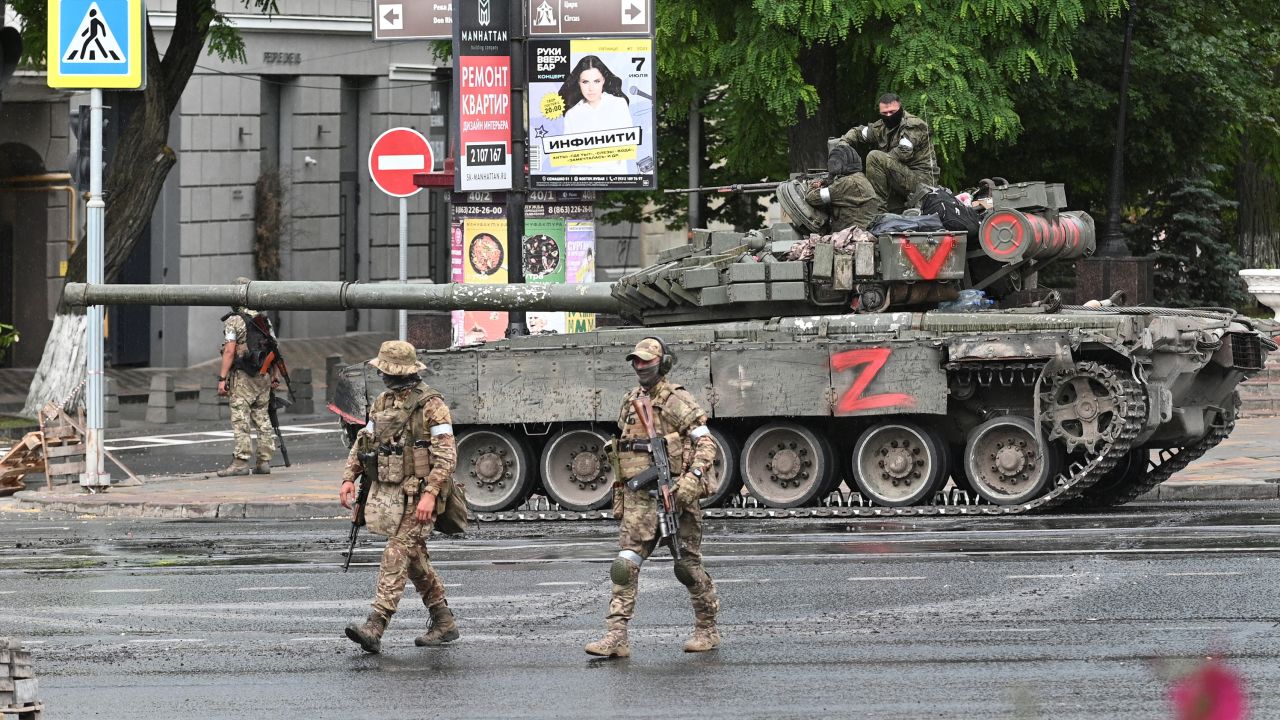
Wagner fighters deployed in a street near the headquarters of the Southern Military District in Rostov-on-Don, on June 24.Stringer/Reuters
The fallout from his comments also inspired a wave of schadenfreude in Ukraine.
Mykhailo Podolyak, an advisor to Ukraine’s presidential office on Saturday described the actions as exposing a deeper schism within the Russian establishment.
“The split between the elites is too obvious. Agreeing and pretending that everything is settled won’t work,” Myhailo Podolyak tweeted. “Someone must definitely lose: either Prigozhin (with a fatal ending), or the collective ‘anti-Prygozhin.’”
“Everything is just beginning in Russia,” he added.
Anton Gerashchenko, an adviser to Ukraine’s minister of internal affairs, added on Saturday that “Ukraine has become a few steps closer to complete Victory over Russia and complete return of its territories, including Crimea.” He called Prigozhin a “vile, but useful” monster, predicting that Putin’s hold on power “will crumble like a house of cards.”
The impact of the events on the war in Ukraine remain murky, but it is difficult to see how Russia could emerge from the drama strengthened on the battlefield. Wagner’s forces have become essential to Russia’s war effort, and the possible redirection of Wagner troops toward the internal conflict would drastically weaken their ground campaign.
Putin
ALSO READ
- Ukraine claims killing thousands of Russian troops
- Comparison Between Ukraine and Russia’s militaries

WANT TO HIRE WEBSITE DESIGNER CONTACT US @Kalda-Tech Systems , See a sample of our work





